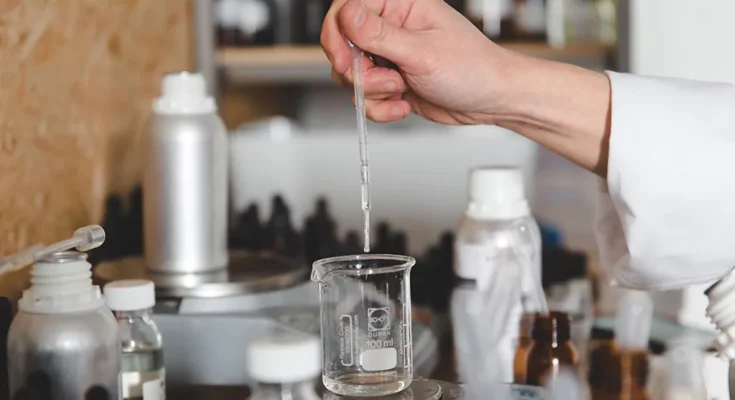To make a perfume fragrance-full, you can follow these steps:
Choose high-quality fragrance oils or essential oils that are strong and long-lasting.
Use a balanced proportion of top, middle, and base notes to create a well-rounded scent.
Experiment with different fragrance combinations to find the perfect balance for your desired scent.
Store the perfume in a cool, dark place to preserve its fragrance.
Re-evaluate and adjust the fragrance strength over time, as the scent may fade with age.
To make a perfume fragrance-full, you can follow these steps:
Choose high-quality fragrance oils or essential oils that are strong and long-lasting.
Use a balanced proportion of top, middle, and base notes to create a well-rounded scent.
Experiment with different fragrance combinations to find the perfect balance for your desired scent.
Store the perfume in a cool, dark place to preserve its fragrance.
Re-evaluate and adjust the fragrance strength over time, as the scent may fade with age.
To make a fragrance for perfumes, the following ingredients are typically used:
Alcohol (such as ethanol or denatured alcohol) is the solvent to dissolve and mixes the fragrance ingredients.
Fragrance oils or essential oils as the main scent components.
Fixatives to help prolong the fragrance and stabilize the scent over time. Common fixatives include benzyl benzoate, silicones, and resins.
Emulsifiers to help mix and stabilize the fragrance ingredients in the alcohol.
Optional ingredients such as water, glycerin, or propylene glycol adjust the consistency and texture of the fragrance.
The specific ingredients and proportions will vary depending on the desired scent, the type of perfume (e.g. eau de parfum, eau de toilette, etc.), and personal preference.
Does fragrance need to make perfumes?
Yes, the fragrance is a key component in perfumes. A fragrance gives a perfume its distinct scent and character, which is what people usually associate with it. The fragrance is created by blending various fragrance oils or essential oils, which is why people wear perfumes.
There are several benefits to making perfume:
- Creative expression: Perfume making allows individuals to express their creativity by combining different scents to create a unique fragrance.
- Personalized fragrance: By making their perfume, individuals can create a fragrance that is customized to their taste and style.
- Cost savings: Making perfume at home can be less expensive than buying commercial fragrances.
- Sustainability: Perfume making can be a sustainable and eco-friendly alternative, as it reduces waste and promotes using natural ingredients.
- Gift-giving: Perfumes make excellent gifts for friends and loved ones. Individuals can personalize the gift and make it truly unique by making their fragrances.
- Business opportunity: For those passionate about perfumes, making and selling fragrances can be lucrative.
Benefits for the making perfume Fragrance
Perfumes do not necessarily need to be made to have a fragrance. Commercial perfumes, readily available in the market, have already been created and blended to provide a specific scent. Making perfumes can be a personal and creative endeavour for those who enjoy experimenting with different scents and creating their fragrances.
Here are some of the most premium ingredients used in making perfumes:
- Essential oils are highly concentrated plant extracts that create a fragrance in perfumes. Some most commonly used essential oils include jasmine, rose, lavender, ylang-ylang, and sandalwood.
- Absolutes: Absolutes are similar to essential oils but are extracted using solvents rather than steam distillation. Some of the most premium absolutes include rose, jasmine, and orange blossom.
- Natural isolates: Natural isolates are single fragrance compounds isolated from natural sources such as plants, flowers, and fruits. Some of the most premium natural isolates include jasmine, narcissus, and tuberose.
- Synthetic fragrances: Synthetic fragrances are artificially created fragrances used to mimic natural ingredients’ scents. Some of the most premium synthetic fragrances include musk, ambroxan, and cashmeran.
- Alcohol: High-quality alcohol is used as a solvent and fixative in perfumes. Some of the most premium alcohols used in perfumery include ethanol and denatured alcohol.
- Floral waters: Floral waters, also known as hydrosols, are the by-products of steam distillation and are used in perfumes to add a light, fresh fragrance. The most premium floral waters include rose, lavender, and orange blossom.
Here are some tips to make the fragrance last longer:
- Apply to pulse points: Apply the perfume to pulse points such as the wrists, neck, and behind the ears, as these areas generate heat and help to diffuse the scent.
- Layer with products: Layer your fragrance with matching body lotions, shower gels, and deodorants to enhance and prolong the scent.
- Store properly: Store perfumes in a cool, dark place away from direct sunlight and heat to prevent the fragrances from breaking down and losing their potency.
- Use a fragrance primer: Using a fragrance primer before applying the perfume can help to enhance the scent and make it last longer.
- Use the right amount: It is important to use the right fragrance. Over-applying can make the scent overpowering and also shorten its lifespan.
- Avoid alcohol-based products: Alcohol-based products can dry out the skin, making the fragrance fade faster.
- Reapply as needed: If the fragrance starts to fade, reapply to keep the scent throughout the day.
In conclusion, making perfume is a creative and personal endeavour that offers a range of benefits. Whether for personal use, gift-giving, or as a business opportunity, perfume-making allows individuals to express their individuality and style through scent. To create a long-lasting fragrance, it is important to use premium ingredients, apply to pulse points, layer with products, store properly, use the right amount, and reapply as needed. With the right techniques and ingredients, anyone can make a high-quality, long-lasting fragrance that they will enjoy wearing or sharing with others.



